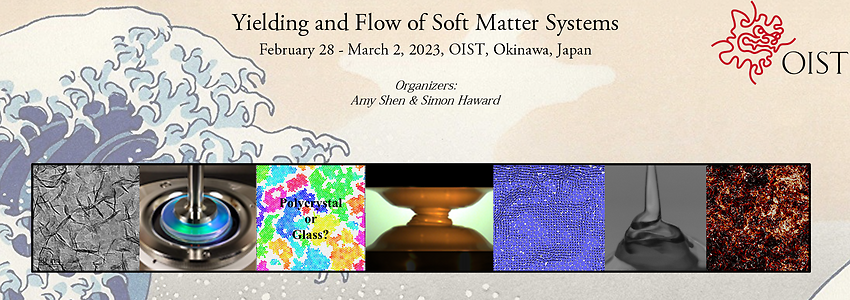OIST Mini Symposium "Yielding and Flow of Soft Matter Systems"
Date
2023-02-28 (Tuesday) - 2023-03-02 (Thursday)
Location
- February 28: C209 (OIST Campus)
- March 1 & 2: Chura Hall (OIST Seaside House)
Description
Many everyday soft materials (e.g. pastes, foams, muds, blood) have properties of both solids and liquids and can undergo a solid/liquid transition under an external applied perturbation. Such fluids are known as yield stress (or elasto-visco-plastic, EVP) materials and they exhibit diverse non-linear phenomena related to complex microstructural and particle network rearrangements that have implications for a wide range of industrial applications and natural processes. Consequently, there is great interest in improving the understanding EVP materials from a fundamental physics perspective and in developing strategies to predict and control their behavior. Although the field has grown substantially over recent years, the characterization of material dependent yielding properties still poses many open questions for experimental, numerical and theoretical researchers.
This mini-symposium will bring together world-leading researchers from the fields of engineering, rheology, applied mathematics and physics to review the current state-of-the-art in characterizing and understanding yield stress behavior in complex fluids, ranging from fundamental to applied perspectives. The mini-symposium will also provide a forum for the initiation of collaborations between researchers at OIST and leading experts from the wider scientific community. In fact, most significant contributions in the field have come from a combined effort from experiment-theory studies along with numerical simulations. These goals will be accomplished through 2.5 days of talks and informal discussions.
Invited external speakers:
- Prof. Gareth McKinley, Massachusetts Institute of Technology
- Prof. Simon Rogers, University of Illinois at Urbana-Champaign
- Prof. Emanuela Del Gado, Georgetown University
- Prof. Sarah Hormozi, Cornell University (virtual)
- Prof. Yogesh Joshi, IIT Kanpur (virtual)
- Prof. Suzanne Fielding, Durham University (virtual)
- Prof. John Tsamopoulos, University of Patras
- Prof. Tsutomu Takahashi, Nagaoka University of Technology
- Prof. Yilong Han, The Hong Kong University of Science and Technology
- Prof. Thibaut Divoux, Ecole Normale Superieure de Lyon
- Prof. Yoko Yamanishi, Kyushu University
OIST speakers:
- Prof. Marco Rosti, Complex Fluids and Flows Unit
- Dr. Simon Haward, Micro/Bio/Nanofluidics Unit
- Dr. Stylianos Varchanis, Micro/Bio/Nanofluidics Unit
- Dr. San To Chan, Micro/Bio/Nanofluidics Unit
- Mr. Mohamed Abdelgawad, Complex Fluids and Flows Unit
Sponsor or Contact:
Micro/Bio/Nanofluidics Unit (Amy Shen, Simon Haward)
Code of Conduct
Purpose
To ensure that all participants have a clear understanding of the behavior that is expected of them.
Code of Conduct
We are committed to making our workshops (workshop(s) organized by OIST, hereinafter “our workshop(s)”) an inclusive space for sharing ideas and knowledge. We will not tolerate disrespectful communication, discrimination, harassment, or bullying in any form. As such, all participants attending our workshops are required to comply with this Code of Conduct. To provide all participants the opportunity to benefit from our workshops, we at OIST are dedicated to a positive, safe and harassment-free experience. Harassment in any form is specifically prohibited.
What is Harassment?
Harassment involves continued antisocial or unreasonable actions that violate a reasonable person’s personal rights and/or dignity and cause mental suffering, and thus worsen the person’s environment or make him/her anxious about participation. Behavior that is acceptable to one person may not be acceptable to another, so we ask that you use discretion to be sure that respect is communicated. Harassment intended in a joking manner nevertheless constitutes unacceptable behavior. Speech that is not welcomed or that is personally offensive, whether it is based on gender, age, sexual orientation, mental or physical disability, ethnicity, national origin, religion etc. will not be tolerated.
If you are being harassed, notice that someone else is being harassed, or have any other concerns, please bring this to the immediate attention of the organizers.
If you wish to report an issue concerning the organizers, you can contact the Conference and Workshop Section directly and submit a confidential report by sending an email to workshop-codeofconduct@oist.jp or submitting a report through this webform (https://groups.oist.jp/cws/workshop-code-of-conduct). All complaints will be taken seriously and responded to by the Provost promptly. Confidentiality will be maintained to the extent that it does not compromise the rights of others. Individuals found in breach of this Code of Conduct will be dismissed from the workshop immediately. Retaliation for reporting harassment is also a violation of Code of Conduct, as is reporting an incident in bad faith.





